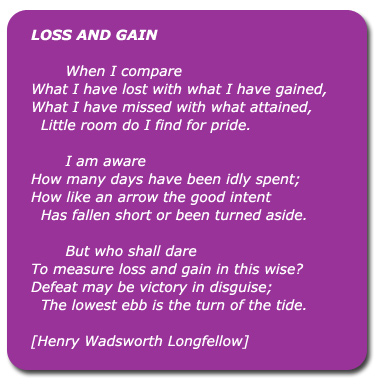

|
|
Loss & Healing
|
|
||||||||||
Poetry is a powerful source of comfort and inspiration when facing the expected loss of a loved one or in recovering from loss. It can illuminate the nature of death and dying, provide an uplifting emotional outlet, and enrich understanding through texture and detail that reveals life as unique, lyrical in some aspects, and full of lasting value despite its transitory nature. It infuses life and loss with meaning beyond ordinary perception. Tinkers and The Year of Magical Thinking are two full-length books that deal exquisitely with the nature of losing and healing. Breathless, a booklet of poems by a registered nurse, honors her terminally ill patients. The compilation by Kevin Young of poetry about grief and losing is a remarkable gift to people suffering loss. "Piercing" reflects the efforts of a 12-year old girl to deal with the loss of her beloved grandmother. “Do you hear it?” by Tom Togashi is from the diary he kept during his last year of life, gracefully and graciously accepting terminal illness at the age of 60.
|
TINKERS, Paul Harding, 191 pages, Pulitzer Prize for Fiction 2010, Bellevue Literacy Press, http://www.tinkerspulitzer.com. Also see other titles by Bellevue Literary Press. http://blpbooks.org
THE YEAR OF MAGICAL THINKING, 227 pp, Joan Didion, National Book Award, 2005. Within a very short period, Joan Didion lost both her daughter and her husband, one to a prolonged illness and the other, her life partner for 40 years, in a sudden moment. She wrote The Year of Magical Thinking to “make sense of the period that followed, weeks and then months that cut loose any fixed idea I have ever had about death, about illness, about probability and luck, about good fortune and bad, about marriage and children and memory, about grief, about the ways in which people do and do not deal with the fact that life ends, about the shallowness of sanity, about life itself." http://www.nytimes.com/2005/10/09/books/review/09pinsky.html?adxnnl=1&adxnnlx=1305396106-SJmm0786oaw5400/W9prlA
|
BREATHLESS, 25 pp, Jeanne Bryner, 1995, Number 7 in the Wick Poetry Chapbook Series, Kent State University Press. This little booklet of 18 poems brings the poetic perspective of Jeanne Bryner, a registered nurse at a hospital in Ohio, to her experiences with her terminally-ill patients. It is an extraordinary effort by a deeply compassionate healthcare professional to celebrate and recognize her patients by putting their words and feelings into a poetic form that also reflects her own feelings. http://www.kentstateuniversitypress.com/category/series/chapbook |
Warblers When we wrestle soft old people In wheelchairs, they become reels Hasn’t the sky already tumbled? What can I do but catch this string, I find it impossible not to imagine |
THE ART OF LOSING: POEMS OF GRIEF & HEALING, 336 pages, edited by Kevin Young, Bloomsbury Publishing, March 2010. This remarkable collection of poetry was compiled by poet Kevin Young as a way to deal with his sense of loss on the death of his father. The book has quickly become an inspiration to many others. He wrote about the book that "the best poems are precise about a feeling…[able to be] direct and…full out, but also make music out of it” and metaphor and meaning. http://www.npr.org/templates/story/story.php?storyId=126282089 |
I am in need of music that would flow Here is a magic made by melody: One Art The art of losing isn't hard to master; Lose something every day. Accept the fluster Then practice losing farther, losing faster: I lost my mother's watch. And look! my last, or I lost two cities, lovely ones. And, vaster, Even losing you (the joking voice, a gesture [Elizabeth Bishop]
|
Memory of W. B. Yeats Earth, receive an honoured guest: In the nightmare of the dark Intellectual disgrace Follow, poet, follow right With the farming of a verse In the deserts of the heart [W. H. Auden]
|
Redemption Song Finally fall. Grief might be easy maple didn’t thrust All this might be easier if my mind like water. At night I sleep falls, crying taking you away, you can’t forget. grown quiet. [Kevin Young]
|
|
Piercing Every day I see you Your sweet smiling face I can hear your screams You've become a part of me But soon I'll have to accept Know that you'll always be mine You'll never be gone It's growing larger and larger Even though you're leaving Know that you'll always be mine You'll [Izzy Hanson-Johnston, 12 years old, 2011] |
|
Do you hear it? I never dreamt I would be able to lead such a great life. What should I do from now on? Do you hear it, the music of courage? Do you hear it, the sound of the waves of love |
OTHER LOSS & HEALING RESOURCES — Caring for An Elderly Parent at Home, by Marye Audet, is a sensitive and inspiring account of her experience in caring for her mother at home during the last several months of her life. The author offers guidance to make parental (or any other) end-of-life care at home easier for both the caregiver and the terminal patient. http://maryeaudet.hubpages.com/hub/Aging-Parents — The Unspoken Diagnosis: Old Age, by Paula Span, speaks about the question of when physicians should speak candidly with their patients and their families when terminal illness is near. Dr. Smith is a palliative care specialist in practice at the V.A. Medical Center in San Francisco. See The New Old Age article in the Dec. 29, 2011 issue of the New York Times http://newoldage.blogs.nytimes.com/2011/12/29/the-unspoken-diagnosis-old-age/
|
Leave a Comment |
E-Mail List |
Policy |
